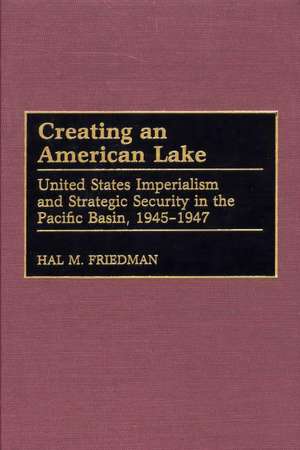Creating an American Lake: United States Imperialism and Strategic Security in the Pacific Basin, 1945-1947: Contributions in Military Studies
Autor Hal M. Friedmanen Limba Engleză Hardback – 29 noi 2000 – vârsta până la 17 ani
Din seria Contributions in Military Studies
- 24%
 Preț: 463.55 lei
Preț: 463.55 lei - 28%
 Preț: 438.00 lei
Preț: 438.00 lei - 24%
 Preț: 463.13 lei
Preț: 463.13 lei - 27%
 Preț: 438.59 lei
Preț: 438.59 lei - 28%
 Preț: 437.47 lei
Preț: 437.47 lei - 38%
 Preț: 437.84 lei
Preț: 437.84 lei - 28%
 Preț: 436.64 lei
Preț: 436.64 lei - 30%
 Preț: 556.53 lei
Preț: 556.53 lei - 30%
 Preț: 616.88 lei
Preț: 616.88 lei - 28%
 Preț: 435.88 lei
Preț: 435.88 lei - 30%
 Preț: 571.34 lei
Preț: 571.34 lei - 30%
 Preț: 592.75 lei
Preț: 592.75 lei - 38%
 Preț: 439.44 lei
Preț: 439.44 lei - 24%
 Preț: 461.52 lei
Preț: 461.52 lei - 28%
 Preț: 438.07 lei
Preț: 438.07 lei - 24%
 Preț: 461.87 lei
Preț: 461.87 lei - 28%
 Preț: 462.20 lei
Preț: 462.20 lei - 28%
 Preț: 362.29 lei
Preț: 362.29 lei - 30%
 Preț: 494.84 lei
Preț: 494.84 lei - 24%
 Preț: 463.97 lei
Preț: 463.97 lei - 24%
 Preț: 461.35 lei
Preț: 461.35 lei - 24%
 Preț: 463.72 lei
Preț: 463.72 lei - 37%
 Preț: 511.48 lei
Preț: 511.48 lei - 24%
 Preț: 460.43 lei
Preț: 460.43 lei - 28%
 Preț: 436.80 lei
Preț: 436.80 lei - 28%
 Preț: 436.40 lei
Preț: 436.40 lei - 28%
 Preț: 462.37 lei
Preț: 462.37 lei - 35%
 Preț: 458.04 lei
Preț: 458.04 lei - 28%
 Preț: 462.28 lei
Preț: 462.28 lei - 27%
 Preț: 463.38 lei
Preț: 463.38 lei - 27%
 Preț: 638.85 lei
Preț: 638.85 lei - 27%
 Preț: 465.68 lei
Preț: 465.68 lei - 24%
 Preț: 461.77 lei
Preț: 461.77 lei - 27%
 Preț: 439.17 lei
Preț: 439.17 lei - 27%
 Preț: 440.53 lei
Preț: 440.53 lei - 35%
 Preț: 460.76 lei
Preț: 460.76 lei - 28%
 Preț: 437.57 lei
Preț: 437.57 lei - 28%
 Preț: 468.66 lei
Preț: 468.66 lei - 24%
 Preț: 463.64 lei
Preț: 463.64 lei - 24%
 Preț: 464.57 lei
Preț: 464.57 lei - 23%
 Preț: 492.54 lei
Preț: 492.54 lei - 24%
 Preț: 462.87 lei
Preț: 462.87 lei - 27%
 Preț: 465.68 lei
Preț: 465.68 lei - 27%
 Preț: 439.51 lei
Preț: 439.51 lei - 27%
 Preț: 346.25 lei
Preț: 346.25 lei - 27%
 Preț: 500.43 lei
Preț: 500.43 lei - 27%
 Preț: 617.60 lei
Preț: 617.60 lei - 18%
 Preț: 355.91 lei
Preț: 355.91 lei - 27%
 Preț: 682.72 lei
Preț: 682.72 lei - 28%
 Preț: 362.72 lei
Preț: 362.72 lei
Preț: 463.05 lei
Preț vechi: 609.69 lei
-24% Nou
Puncte Express: 695
Preț estimativ în valută:
88.62€ • 91.81$ • 73.96£
88.62€ • 91.81$ • 73.96£
Carte tipărită la comandă
Livrare economică 22 martie-05 aprilie
Livrare express 15-21 februarie pentru 65.55 lei
Preluare comenzi: 021 569.72.76
Specificații
ISBN-13: 9780313313011
ISBN-10: 0313313016
Pagini: 256
Dimensiuni: 156 x 235 x 24 mm
Greutate: 0.58 kg
Ediția:New.
Editura: Bloomsbury Publishing
Colecția Praeger
Seria Contributions in Military Studies
Locul publicării:New York, United States
ISBN-10: 0313313016
Pagini: 256
Dimensiuni: 156 x 235 x 24 mm
Greutate: 0.58 kg
Ediția:New.
Editura: Bloomsbury Publishing
Colecția Praeger
Seria Contributions in Military Studies
Locul publicării:New York, United States
Notă biografică
Hal M. Friedman is a full-time modern history instructor at Henry Ford Community College in Dearborn, Michigan, where he also teaches courses in modern American and modern world history. In addition, he teaches upper-division and graduate courses for Central Michigan University-Metro Detroit. He has MA and PhD degrees in the history of international relations from Michigan State University. Dr. Friedman has 10 articles, 11 book reviews, and 6 encyclopedia entries in print or forthcoming, most of which concern U.S. strategic consolidation over the post-World War II Pacific. This is his first monograph.
Cuprins
ForewordPrefaceIntroductionModified Mahanism: Pearl Harbor, the Pacific War, and the Mobile Defense of the Postwar BasinThe "American Lake" Effect and U.S. Pacific Basin Security Policy in the 1940sThe "Bear" in Paradise?: U.S. Intelligence Perceptions of Soviet Power Projection in the Pacific BasinThe Limitations of Collective Security: The United States, the Allied Powers, and the Pacific BasinChosen Instruments and Open Doors in Paradise: United States Strategic Security and Economic Policy in the Pacific Islands"Races Undesirable from a Military Point of View": United States Cultural Security and the Pacific Islands"As a Forward Bulwark of the American Way of Life": Americanization as a Strategic Security MeasureConclusion: Out with the Old, in with the New?: Continuities and Changes in American Pacific PolicyBibliographyIndex
Recenzii
Hal Friedman, in his detailed study of U.S. military policy in the Pacific in the same time period, has rendered an important service to historians of the Cold War and of the U.S. international activities . . . [F]riedman shows how even innocent motives can and did lead to imperialist control over indigenous peoples of the Pacific and how it heightened rather than defused global conflict.
[T]his is an impressive book. The research is extensive. The bibliography, fifteen pages long, is an important source for the specialist. Students and experts on the cold war, the Pacific region, and strategic studies will profit from reading it.
This book is well written, exhibits solid research, and offers a cohesive intrepretation of American policy in the postwar Pacific. For the specialist, and particularly for the graduate student studying American foreign relations and military policy, Creating an American Lake is worth the time.
[T]his is an impressive book. The research is extensive. The bibliography, fifteen pages long, is an important source for the specialist. Students and experts on the cold war, the Pacific region, and strategic studies will profit from reading it.
This book is well written, exhibits solid research, and offers a cohesive intrepretation of American policy in the postwar Pacific. For the specialist, and particularly for the graduate student studying American foreign relations and military policy, Creating an American Lake is worth the time.







